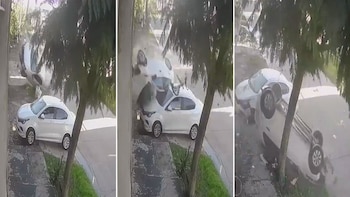
The last legislative elections that took place on March 13 left around an atmosphere of institutional distrust due to all the irregularities that arose in the pre-counting of votes and which were denounced by citizens and different political movements on social networks. Due to the above, the firm of Figures and Concepts published the Polimétrica survey where it highlighted the disagreement of citizens with the actions of the voting juries and the political landscape of the country.
The firm used a sample of 1843 surveys distributed in the cities of Bogotá: 467, Medellín: 192, Cali: 175, Barranquilla: 126, Cartagena: 104, Manizales: 104, Monteria: 89, Villavicencio: 94, Pasto: 77, Cucuta: 105, Pereira: 106, Bucaramanga: 109 and Ibague: 95. Of the total respondents, 45% said that the behavior of the jurors was irregular, 13% that it was very bad and the remaining that it was good. In addition, 11% said they were approached by unknown people to influence their voting decision; and 8% noted that they approached them to buy their vote.
It should even be mentioned, as El Tiempo pointed out that the electoral entity prepared a report, which it submitted to the supervisory bodies, in which it reported 22,255 inconsistencies attributable, apparently, to several of the voting juries that participated on that day.
Other aspects evaluated in this poll are related to the upcoming presidential elections, in this sense 78% of respondents said they voted in the interparty consultations, 66% said that the candidate for whom they voted in the consultations won; and 83% said they will vote in the first presidential round for the candidate who won in the consultation he supported on 13 March.
With regard to the result of past votes, new developments continue to be reported. On April 11, the national registrar of civil status, Alexander Vega, noted that the difference in votes between the pre-counting and the counting of legislative elections and interparty consultations was widened.
The figure is one million votes, among which are the 500,000 that the Historical Pact reached, and another 500,000 more for different political movements, the official said.
The official indicated that there are about 1′026,000 votes — a figure that, he said, may vary between pre-counting and counting — so the distribution of this amount among the other communities and candidates for the Senate of the Republic should be expected.
However, the difference between pre-counting and counting is 1 and 2 per cent, but for these legislatures it reached a difference of more than 7%.
“There was no fraud,” said the official, who refuted information provided by NOTICIAS RCN in which inconsistencies were pointed out in this part of the electoral process.
In addition to this controversial fact, the official referred to complaints about forms poorly filled out by officials at the polling stations:
“It was corroborated that 23,000 forms were poorly filled out by the voting juries. In addition, we found that, in 5,109 tables, a possible malice is demonstrated, because in addition to filling out the forms in the wrong way, the votes of the candidates were crossed out,” Vega replied to criticism of irregularities reported in various media outlets.
KEEP READING
Últimas Noticias
Debanhi Escobar: they secured the motel where she was found lifeless in a cistern
Members of the Specialized Prosecutor's Office in Nuevo León secured the Nueva Castilla Motel as part of the investigations into the case

The oldest person in the world died at the age of 119
Kane Tanaka lived in Japan. She was born six months earlier than George Orwell, the same year that the Wright brothers first flew, and Marie Curie became the first woman to win a Nobel Prize

Macabre find in CDMX: they left a body bagged and tied in a taxi
The body was left in the back seats of the car. It was covered with black bags and tied with industrial tape
The eagles of America will face Manchester City in a duel of legends. Here are the details
The top Mexican football champion will play a match with Pep Guardiola's squad in the Lone Star Cup

Why is it good to bring dogs out to know the world when they are puppies
A so-called protection against the spread of diseases threatens the integral development of dogs




